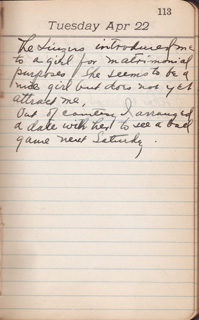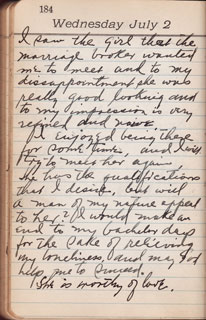
Met Miss Beck, she is
a fine girl, Really something
is wrong with me, Why do
I always go to the farthest
points in the city for certain
girls company, when I can
have some within my grasp.
Miss Beck is my neighbor
and I like her company
I will make an effort
to see her often, as she
told me that I am always
welcome to come up the house.
——————-
Matt’s Notes
I think it would be easy to dismiss Papa’s observation about himself — “why do I always go to the farthest points in the city for certain girls company when I can have some within my grasp” — as a variation on the complaint of a certain type of single New Yorker who claims to want to settle down but who, for whatever reason, just keeps playing.
I don’t think it’s that easy, though. My mother recently told me that Papa had a reputation in my family as a “ladies man,” which may well be how he outwardly appeared. We know he was good-looking, well-dressed, and socially active, and he seemed to suffer no shortage of dates and even dramatic encounters with secret admirers despite his intense, inner loneliness.
I think what we may be observing here as he agonizes over the birds in the bush is the flip side of his capacity for idealism. We’ve already observed his tendency to idealize — causes, Presidents, his past, the lives of others — and I think he applied it to women as well. Henriette, the woman for whom Papa’s been pining for days, may well be beautiful and socially ambitious, but, as my mother observes, “she was only a poor girl from the Bronx, after all, who may have had a high school education, if that,” and certainly not worthy of descriptions like “the perfect 20th Century Girl” with “eyes of enchantment” who “stands above other women.”
This idealized image was, I think, what made Papa’s crush on Henriette so hard on him. She may have stood above other women in his eyes, but as a side effect she also stood above him. In contrast to her, he saw himself as a “poor dog,” a “wage earner” who had no right to expect anything of her, which was of course unreasonable; it’s not like he was some groundskeeper in a British novel who wanted to marry the daughter of his lord and master. He was just a struggling Jewish immigrant from the Lower East Side who wanted to date someone from his same social caste. But unlike his neighbor Miss Beck, whose proximity allowed him to see her in less-than-ideal condition once in a while, Henriette lived far away and could only be observed on occasion; she made a perfect target for his idealization, and, unfortunately, an inadvertent trigger for his sense of romantic hopelessness.
What I don’t understand, and will keep thinking about, his how Papa’s idealistic nature remained intact but evolved into something more constructive as he grew older. Idealists may find themselves disappointed on occasion, but they also have the capacity to be forgiving, resilient, thrilled by little things — the very qualities that made him such a fine activist, dedicated husband and father, and memorable grandfather. When, and how, did this evolution occur? Are we all capable of such change?







